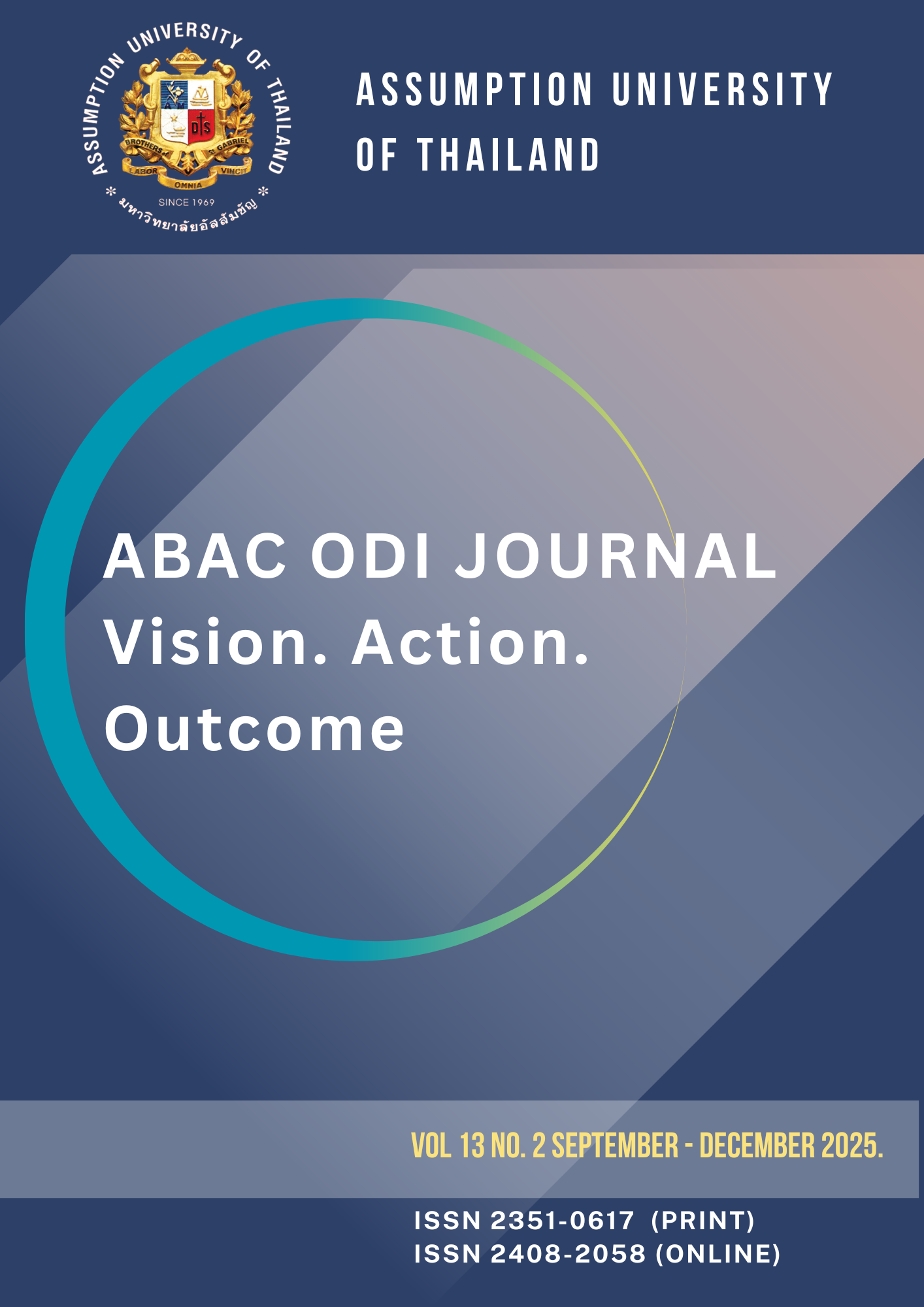A Study of Teachers’ Perceptions of the Principal’s Leadership Style and Their Job Satisfaction at Nelson English Language Centre, Yangon, Myanmar
DOI:
https://doi.org/10.14456/abacodijournal.2025.48Abstract
This study explores the relationship between principal leadership styles and teachers’ job satisfaction at Nelson English Language Centre in Yangon, Myanmar. Grounded in transformational and transactional leadership theories, Maslow’s Hierarchy of Needs, and Herzberg’s Two-Factor Theory, a quantitative methodology was employed. Data were collected via surveys from 80 teachers. Findings revealed that teachers perceived their principal’s leadership style as primarily transformational, with a mean score of 3.18 on a five-point scale, while their job satisfaction was rated moderately high, averaging 3.45. Statistical analysis showed a significant positive correlation between transformational leadership and job satisfaction (r = 0.68, p < 0.01) and a moderate positive correlation with transactional leadership (r = 0.52, p < 0.05). These results suggest that transformational leadership practices—such as inspirational motivation, intellectual stimulation, and individualized consideration—are closely linked to higher teacher satisfaction. School leaders are encouraged to adopt more transformative approaches to foster supportive, motivating environments that enhance teacher morale and retention. This research adds valuable insights to the limited literature on educational leadership and job satisfaction in Myanmar’s private language schools. It highlights the critical role of leadership styles in promoting organizational effectiveness.
References
Avolio, B. J., & Bass, B. M. (2004). MLQ: Multifactor leadership questionnaire. Mind Garden.
Avolio, B. J., Bass, B. M., & Jung, D. I. (1999). Re‐examining the components of transformational and transactional leadership using Multi-factor Leadership. Journal of occupational and organizational psychology, 72(4), 441-462.
Barnett, K., McCormick, J., & Conners, R. (2001). Transformational leadership in schools–panacea, placebo or problem?. Journal of educational administration, 39(1), 24-46.
Bass, B. M. (1999). Two Decades of Research and Development in Transformational Leadership. European Journal of Work and Organizational Psychology, 8(1), 9-32.
Bass, B. M., & Avolio, B. J. (1996). Multi-factor leadership questionnaire. Western Journal of Nursing Research, 1-28.
Bass, B. M., & Avolio, B. J. (1999). Full range leadership development: Manual for the Multi-factor Leadership Questionnaire. Mind Garden.
Bass, B. M., & Avolio, B. J. (Eds.). (1994). Improving organizational effectiveness through transformational leadership. Sage.
Bass, B. M., & Bass Bernard, M. (1985). Leadership and performance beyond expectations. Free press.
Bass, B. M., & Riggio, R. E. (2006). Transformational leadership. Psychology Press.
Bass, B. M., & Stogdill, R. M. (1990). Bass & Stogdill’s handbook of leadership: Theory, research, and managerial applications. Simon and Schuster.
Biggerstaff, J. K. (2012). The relationship between teacher perceptions of elementary school principal leadership style and teacher job satisfaction. Western Kentucky University.
Bogler, R. (2001). The influence of leadership style on teacher job satisfaction. Educational administration quarterly, 37(5), 662-683.
Emery, C. R., & Barker, K. J. (2007). The effect of transactional and transformational leadership styles on the organizational commitment and job satisfaction of customer contact personnel. Journal of organizational culture, communications and conflict, 11(1), 77.
Geijsel, F., Van Den Berg, R., & Sleegers, P. (1999). The innovative capacity of schools in primary education: A qualitative study. International Journal of Qualitative Studies in Education, 12(2), 175-191.
Herzberg, F. (1959). The motivation to work. Wiley.
Herzberg, F., Mausner, B., & Snyderman, B. B. (1959). The motivation to work (2nd ed.). Wiley.
Ingersoll, R. M. (2001). Teacher Turnover and Teacher Shortages: An Organizational Analysis. American Educational Research Journal, 38(3), 499-534.
Judge, T. A., & Piccolo, R. F. (2004). Transformational and transactional leadership: a meta-analytic test of their relative validity. Journal of Applied Psychology, 89(5), 755.
Koh, W. L., Steers, R. M., & Terborg, J. R. (1995). The effects of transformational leadership on teacher attitudes and student performance in Singapore. Journal of organizational behavior, 16(4), 319-333.
Leithwood, K., & Jantzi, D. (2006). Transformational school leadership for large-scale reform: Effects on students, teachers, and classroom practices. School effectiveness and school improvement, 17(2), 201-227.
Lester, P. E. (1987). Development and factor analysis of the teacher job satisfaction questionnaire (TJSQ). Educational and psychological Measurement, 47(1), 223-233.
Northouse, P. G. (2018). Leadership: Theory and Practice (8th ed.). Sage Publications
Perrachione, B. A., Rosser, V. J., & Petersen, G. J. (2008). Why Do They Stay? Elementary Teachers' Perceptions of Job Satisfaction and Retention. Professional Educator, 32(2), 2.
Wai, H. S., & Santiparp, P. (2020). Factors Affecting on High School Teachers’comptence at Private High School in Yangon, Myanamr During Pandemic Covid-19. AU Hybrid International Conference 2024 on" Entrepreneurship & Sustainability in the Digital Era" under the theme of" People Centric Knowledge in Intelligence World, 1(1), 529-541.




